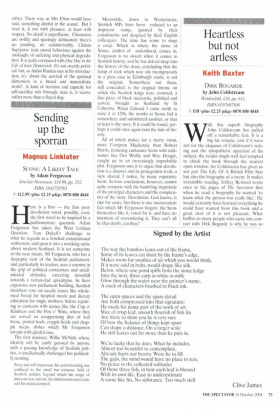Sending up the sporran
Magnus Linklater
SCONE: A LIKELY TALE by Adam Fergusson Sinclair-Stevenson, 114.99, pp. 252, ISBN 1842750763
k12.99 (plus £2.25 p&p) 0870 800 4848 Here is a first — the first postdevolution novel, possibly, even, the first novel to be inspired by a parliamentary question. Adam Fergusson has taken the West Lothian Question, Tam Dalyell's challenge to what he regards as a botched constitutional settlement, and spun it into a mocking satire about modern Scotland. It is set sometime in the near future. Mr Fergusson, who has a dyspeptic view of the Scottish parliament, and particularly its leaders, sees a country in the grip of political correctness and smallminded attitudes, careering downhill towards a tartan-clad apocalypse. In their expensive new parliament building, Scottish members vote on needle issues like wholemeal bread for hospital meals and dietary education for single mothers, before repairing to canteens with names like the Cup o' Kindness and the Pint o' Wine, where they are served an unappetising diet of kail brose, potted hoch, crappit heids and chappit neeps, dishes which Mr Fergusson invents with gleeful ease.
The first minister, Willie McNish, whose identity will be easily guessed by anyone with a passing knowledge of Scottish politics, is intellectually challenged but politically cunning:
Petty and self-important, his understanding was confined to the small but tortuous field of Scottish politics, beyond which his range of interests was narrow, his information uncertain, and his mind cramped.
Meanwhile, down in Westminster, Scottish MPs have been reduced to an impotent rump, ignored by their constituents and despised by their English colleagues. The time has come to stage a coup. Which is where the stone of Scone, symbol of nationhood, comes in. Fergusson is no slouch when it comes to Scottish history, and he has delved deep into the history of the stone, concluding that the lump of rock which now sits incongruously in a glass case in Edinburgh castle, is not the original. Somewhere out there, still concealed, is the original throne on which the Scottish kings were crowned, a fine piece of black meteorite, polished and carved, brought to Scotland by St Columba. When Edward I came north to seize it in 12%, the monks at Scone hid it somewhere and substituted another, or that at least is the story. If it could be found, perhaps it could once again turn the tide of history. All of which makes for a merry romp, more Compton Mackenzie than Robert Harris, featuring caricature Scots with nicknames like Oor Wullie and Wee Dougie, caught up in an increasingly improbable plot. Fergusson uses it to argue that devolution is a disaster and its protagonists fools, a view shared. I notice, by many expatriate Scots. Serious conclusions, however, cannot quite compete with the bumbling ineptitude of the principal characters and the complexities of the story. Devolution, God knows, is ripe for satire, but there is one inconvenient fact which Mr Fergusson forgets: the Scots themselves like it, voted for it, and have no intention of surrendering it. They can't all be that dumb, can they?










































































































 Previous page
Previous page